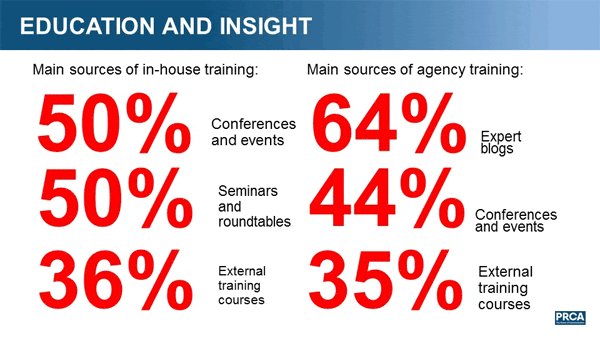Despite a 9% rise in in-house digital budgets in the last year, and expectations that they will continue to rise, it appears from PRCA’s Digital PR and Communications Report 2016, that companies are failing to invest in enough training in this area.
Francis Ingham, director general of PRCA, says: “The lack of investment in good-quality training in key technical skills such as digital and social media continues to be an overwhelming issue for the industry, with 53% of agency professionals saying they require more digital and social media training.
“In light of this, we have seen that the majority of agency professionals seek out training from free and easy-to-use expert blogs (64%), whereas only 35% of agencies and 36% of in-house teams use external training courses as their main sources for digital training.”

Key findings
When asked which three things they need more education in, the biggest percentage of in-house comms people say they need more education/insight around social-influencer outreach/engagement (31%); social-network strategy (27%); and digital-crisis management (27%).
For agency people, as well as over half wishing for more digital/social media training, other areas where they would like more training are SEO (38%); paid search (30%) and paid-social-media activity (26%).

Ingham says that the industry needs to invest in good-quality, yet flexible, training, but the problem is finding the time to fit it in: “With the industry working an average of ten hours of overtime a week (according to the PR Census 2016), we need a flexible, learn-while-you-work, way of building skills, or it just won’t work.”
According to Ingham, one answer to the problem is continutal professional development (CPD): “The process by which practitioners build skills and deepen knowledge in a structured way of continuously reviewing competencies; seeking out best practice; acquiring new tools, techniques and theories; and sharing knowledge.”
However agencies and in-house teams decide to improve their digital skills, the main thing is that they recognise it is a priority. Ingham concludes: “It is now time for agencies and in-house teams to take the initiative to invest in training in order to equip their staff with the skills they need to make businesses more resilient and successful.”
Methodology
The fourth annual PRCA Digital PR and Communications Report, produced in partnership with YouGov, provides a benchmark of how the PR industry is performing with digital communications. The survey spoke to 203 agency and in-house PR professionals across business services, finance and banking, technology and telecoms, charities and NGOs, government and other sectors. In-house respondents include directors of marketing/comms, heads of marketing/ comms, head of press/PR. Agency respondents include CEOs, MDs, partners and directors.
PR Masterclass: The Intersection of PR and GEO
Wednesday 25th February, both virtual and in person tickets are available.
PR MasterclassIf you enjoyed this article, sign up for free to our twice weekly editorial alert.
We have six email alerts in total - covering ESG, internal comms, PR jobs and events. Enter your email address below to find out more:





